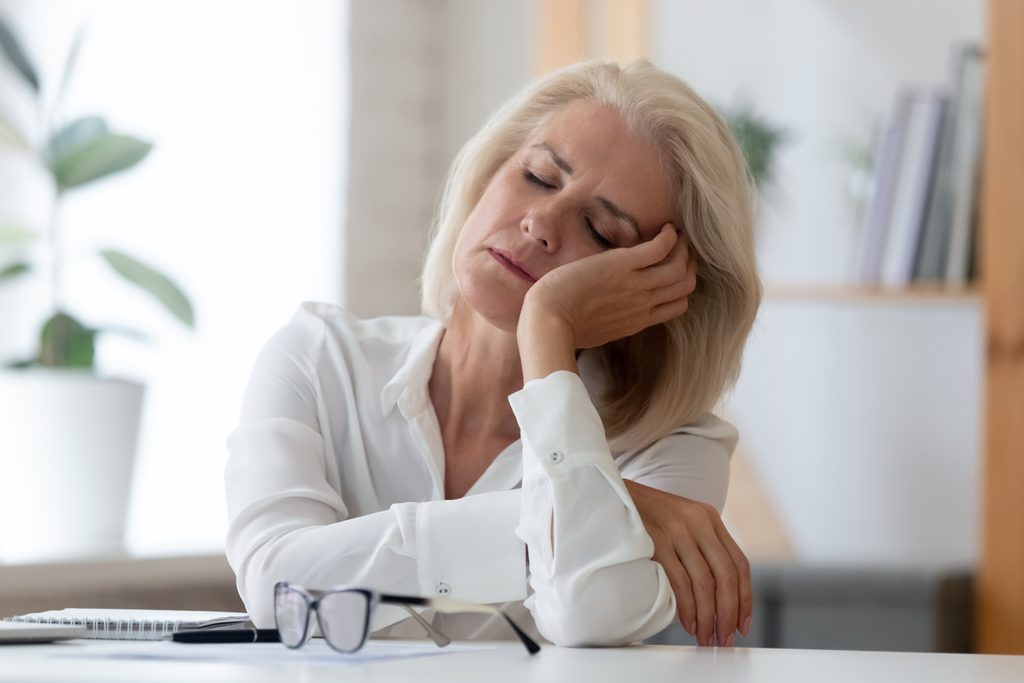5 Easy Lifestyle Changes That Can Help Ease Perimenopause Symptoms

We spoke with Dr. Renee Morissette, a certified menopause practitioner at the Women’s Mid-Life Health Program of Saskatchewan, about small changes that can have a big effect on perimenopause symptoms.
Perimenopause (the life stage that includes the years spent leading up to menopause) can wreak havoc with your hormones, leading to a variety of symptoms that can affect every corner of your life. Dr. Renee Morissette, a family physician and certified menopause practitioner who works at the Women’s Mid-Life Health Program of Saskatchewan, explains evidence-based ways you can ease symptoms.
(Related: 9 Things You Didn’t Know (And Might Forget) About Perimenopause)
Consume strategically
“Adding more fruits and vegetables into your diet, making sure you get adequate protein and optimizing your calcium and vitamin D intake help promote a general sense of well-being. Minimizing caffeine and alcohol are huge for improving sleep, mood, hot flashes and incontinence. But listen, when you’re feeling bad because of your symptoms, it’s going to be more tempting not to abide by these guidelines. I say, as with all these changes, it’s baby steps. When you notice that drinking one cup of coffee a day instead of three, for example, means you’re sleeping better or you have fewer hot flashes or you’re going to the bathroom less, it will help you to reinforce that behaviour. For a lot of women, spicy food triggers hot flashes. For some women, it’s refined sugar. It’s a bit of trial and error, but knowing what your triggers are and trying to limit your intake of them is a big first step.”
Make a move
“At first, women might notice that when they’re more active, they get more hot flashes. But studies do show that women who get into a regular exercise routine — let’s say, 150 minutes per week, split up however you like — have fewer hot flashes, sleep better, have a higher sex drive and have a better sense of well-being. They feel good about themselves. High-intensity interval training has a bit more benefit than some other forms of exercise, especially for weight maintenance. Weight training using light weights or resistance bands is especially important for bone health, which is a concern as women age. But anything that gets your heart rate up is good.”
(Related: Can Hormone Therapy Ease Your Menopause Symptoms?)
Be mindful
“Stress can be a humongous trigger for symptoms. Hot flashes get worse, mood swings can be more intense. But we’re seeing in studies that the meditation practice of mindfulness is great for stress reduction, and practising mindfulness has been linked to fewer hot flashes and better sleep, which leads to better mood and even better sex. For a lot of women, it can be difficult to be in the moment during sex. A big part of mindfulness is being able to enjoy and be present in what’s happening in the here and now. Even practising five minutes a day can produce benefits.”
Experiment with herbals
“The effects are mild to moderate at best, but out of all the herbal treatments, probably the one with the most evidence is soy. It depends on whether a woman has the right enzyme for it to be broken down into the products that help. Studies show that a greater proportion of Asian women have the right enzyme for soy to work. The key to trying herbals is to give it two to three months and then reassess. If, in that time, you do not notice a good enough benefit from herbals, stop taking them, because you should have seen a result by then.”
(Related: 5 Changes to Your Diet to Help Ease Perimenopause and Menopause Symptoms)
Please, just moisturize your vagina
“We don’t talk enough about the discomfort of vaginal dryness. More than 60 percent of women in the later years of menopause experience it. This is something you can solve without ever talking to a doctor! Drugstore vaginal moisturizers are just like a moisturizer for the body but formulated for the vagina — look for ones with hyaluronic acid, which are particularly effective.”




